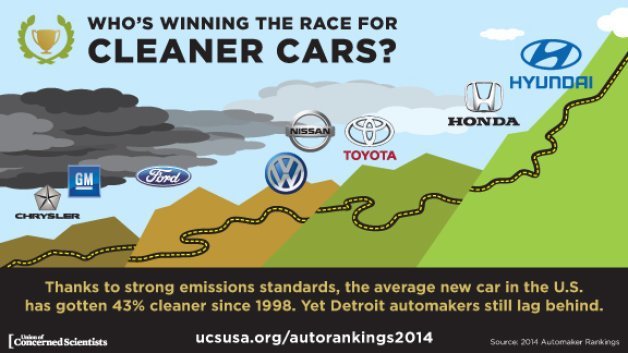Hyundai-Kia Claims 'Greenest' Title from Honda, Big Three Still Big Losers

The bad news? The big three Detroit automakers are, on average, still making the dirtiest cars in the showroom.
The problem for Ford, General Motors and Chrysler lies in their trucks, which sell well but tend to have pretty bad fuel economy (compared to sedans, at least). The UCS calculates its list by averaging "the per-mile emissions for each light-duty vehicle sold by each automaker" and then factors in "the fuel economy, fuel type, and sales volume of each type of vehicle sold by each automaker" and "the upstream global warming emissions from producing and distributing the fuel used by each vehicle, as well as emissions from the vehicles themselves." That all means that, the more trucks you sell, the worse you're gonna do. Then again, the more trucks you sell with 18 mpg, the more you're helping drivers put CO2 into the air, so the UCS is doing a fair comparison of the things that this study is trying to track. More details on the methodology are available on page six of the study PDF.
In case you were wondering (we were), UCS did make sure to use the revised mpg numbers for Hyundai and Kia models that were originally overstated. Hyundai has apologized for and fixed those figures and even with the new, corrected numbers, Hyundai's total emissions are dropping at a rate of about three percent a year, enough for it to take the greenest company title for the first time.
In fact, this is the first time that an automaker other than Honda has come out on top in the UCS ranking, which has been released six times now, including the first one in 2000 (which looked at 1998 model year data). In 2010, Honda was almost knocked off the winner's perch by both Hyundai and Toyota, but managed to hold on. Chrysler, on the other hand, came in dead last (again) in the ranking of the top eight automakers, snagging the "dirtiest tailpipe" award once (again).
Autoblog asked study author Dave Cooke what an automaker could do to improve its score, and he told AutoblogGreen in an email that:
Improving the fuel economy of a manufacturer's biggest sellers should be a top priority. However, boosting sales of a very green vehicle can help as well. For a good example of how both strategies would be helpful, you can look at Nissan-less than two percent of Nissan's sales are the Leaf, but since it performs so much better than the average vehicle, it is able to improve Nissan's score by one percent just by being sold. However, if you improved Nissan's top-selling vehicle, the Altima (~25 percent of sales), by about five percent, this would also give a similar level of improvement. By focusing on both improving its existing, popular vehicles and developing a "green" halo car, Nissan was able to make the most gains in reducing global warming emissions from its fleet since the last rankings.


